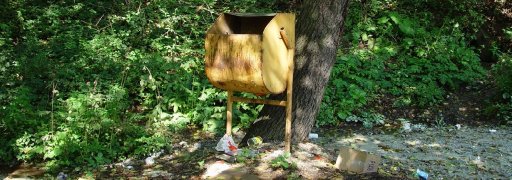
Protector III
- 14,131
- First Name
- Bjoern
- Last Name
- Eldracher
- Member #
-
20111
- Ham/GMRS Callsign
- DO3BE

We all know this situation: We drive along a scenic route, but we cannot really enjoy the scenery, because at the roadside or a great place to spend the night, everything is full of waste.
It goes without saying that we overlanders do not leave our trash at the campsite or throw it out of the car while driving. For many of us it is also a matter of course to collect waste and dispose of it properly.
The question of what we can do to avoid the creation of too much waste is one that I deal with from time to time. Because one thing is quite clear: the most environmentally friendly waste is that, which is not created. This topic moves me from time to time and I have thought about it a lot. Especially when we are on the road, I always have a few thoughts about it. I would like to share them with you and encourage you to think about the topic. Because form many conversations with other Overlanders, I know that this topic also moves others. Therefore, I think it would be cool if we would gather some tips here and so I start this new post.
So, what can we as Overlander do to avoid waste while on the road?
Avoid or reuse disposable plastic bottles
Plastic is not particularly environmentally friendly in terms of the raw materials used. Especially, the disposable plastic is the problem! Disposable plastic bottles create a huge mountain of waste. In the best case these are still recycled to new bottles, foils or textiles. But recycling is extremely resource intensive. Often, they are simply disposed of. Well, what is the alternative on the road? A glass bottle in the rig is quite dangerous, especially on rough roads. In many countries, beverages are only available in plastic bottles. So, when I buy plastic bottles while on the road, I simply use them several times to fill beverages or to transfer water from larger containers to make it easier to drink.
I drink - where it is safe also tap water and reuse plastic bottles for this. Where it is critical to drink tap water simply from the tap, I filter this water with a water filter and then fill it into the (existing) bottles or other bottles.
There are plenty of drinking water filters and even water bottles with integrated filters are available. A great thing on the road! And it avoids plastic waste in the form of disposable bottles.
Refill and don't buy new
Every one of us does it or has done it, grab a Coffee-To-Go at the gas station and there's packaging waste again. Many of us have a cool thermos mug or a thermos flask in the rig. Usually there's even something like that as a giveaway somewhere. The cup or the flask be refilled, waste avoided - it's that simple. To be honest, I rarely find myself taking a paper cup with me, but I'm working on it.
Avoid plastic bags or reuse
Plastic bags are a comparable issue to plastic bottles. When shopping while on the road, for example, we still get plastic bags for free and in large quantities in many countries. We all know this. Yet there are a variety of alternatives: practical folding baskets, nets, bags, etc. Or you can simply take a small backpack for small purchases, which we usually have with us anyway. By the way, these packaging materials can often even be repaired. With regard to this, it is really easy to do without and thus minimize waste. And if it is still a plastic bag, it can also be used as a waste bag.
Replace other plastic products with more environmentally friendly or reusable ones
Many products are available as plastic-free alternatives. Toothpaste, shower gel, etc. In addition, there is also biodegradable soap with natural ingredients or soap in at least recycled plastic packaging. Maybe these products are not for everyone and not everywhere available, but that's a good start, I think.
Another option is to buy products with less or no packaging. Because goods shrink-wrapped in plastic cause unnecessary waste. Of course, this is very easy with fruit and vegetables, which can be bought in bulk, for example, at the market, because in principle they often have natural packaging. In Germany, there are now also so-called unpackaged stores, these stores then offer, for example, that you bring your own packaging. In my experience very practical for the storage of fresh food are small, leak-proof sealable boxes, or wide-neck bottles and containers, which are available in the outfitter stores, for example.
Only buy what is really needed
In many countries of the world, we live in abundance. I especially feel this when I return from a long trip and enter a supermarket in Western Europe for the first time after a trip. It's crazy what a huge selection there is for many products. Exactly this abundance also has another, dark side. Many leftovers go into the waste, because often more is bought than is actually needed. And that even though great dishes can still be made from leftovers. Fresh and regular shopping is the keyword here to avoid waste. Also, on the way I look, if there are no long stages without supply, always gladly into the tiny stores at the roadside or on small markets. This is fun on the one hand, maybe you could get nice contact with the locals, leave a little money there and so support the area and also still have fresh local goods. Of course, if I plan to be self-sufficient on the road for several days, I have to stock up.
Buying good quality products
"Who buys cheap, buys twice", says a proverb, and I supplement this with a "and causes unnecessary waste" (of course knowing that this proverb has its limitations).
We Overlander often carry quite a bit of gear, tools and clothing. If we buy good quality and repairable items, this can save annoying defects on the road and it ultimately helps to avoid waste, because an item is for example not irreparably defective after the first tour and must be disposed of.
Rechargeable batteries instead of batteries
We Overlander have many items with us that run on batteries. Headlamps for example. An alternative to batteries, are, of course, rechargeable batteries. Rechargeable batteries can be recharged and usually have a life span of several years. Simple batteries are therefore unnecessary hazardous waste.
Leave it better than you found it
No direct waste prevention and at the beginning already mentioned. Waste collects. Often, we stop here and there anyway, be it to take photos or a small coffee break. It is easy to take a bag then and collect trash that might be lying around and dispose it properly.
Conclusion
There are really many ways to avoid waste. It is clear to me that not all of them are always easy doable or also have a downside. Which experiences did you make and do you have still more tips for the waste avoidance?
By the way, I do not want to raise the teacher-like finger here, but simply collect a few tips that should be a little help and make us think about it. So, each of us can make a small contribution that we can overland this beautiful planet still for a long time. I hope these thoughts help a little.
So have fun, enjoy and make great overlanding trips!





